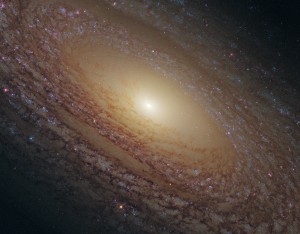Astrobiology and the Religious Imagination
 The Hubble Space Telescope looks at spiral galaxy NGC 2841. Photo via NASA.
The Hubble Space Telescope looks at spiral galaxy NGC 2841. Photo via NASA. What do religion and astrobiology have to do with each other? At first glance, not much. But they both concern the meaning of life, with many religions purporting to have answers to the “right” questions and science continually searching. For many, religious doctrines’ perspective on truth through antiquated, roundabout, and interpretable metaphors no longer provides a satisfying approach. So how does religion stay relevant in the face of scientific reality?
The Library of Congress’s first Blumberg Dialogue this year aspired to answer just that. On March 18 and 19, scholars of religious and scientific backgrounds came together to spend “time in seminar work examining readings and research on astrobiology and its intersections with the world’s religious traditions,” culminating in the one-and-a-half-hour session open to the public: “Astrobiology and the Religious Imagination: Reexamining Notions of Creation, Humanity, Selfhood, and the Cosmos.”
Yet, religion was not able to demonstrate any relevance at all. Despite the religious scholars’ attempts to relate religious thought with astrobiology, they were unable to relate the two with any substance. In fact, science fiction speaks more closely to astrobiology because that imagination is at least informed by the philosophy of science if not basic physical laws.
The scholars present were representative of the fields of planetary and physical sciences, Islamic Studies, Buddhist and Tibetan Studies, Jewish Studies, and Christian Studies. For a dialogue on religion’s intersection with space, it’s surprising that Scientologists (who believe that humans once lived on other planets before living on Earth) and Mormons (whose scriptures describe Kolob, a star or planet, close to the “throne of God,” indicating their deity governs creation of this universe and not all of physical reality) were not represented. Perhaps less surprisingly, atheists or humanists were also not consulted.
The presenters made many statements to try and demonstrate how close the religious imagination is to science, as if they could retroactively validate religious doctrine, much the way that one might try and prove the accuracy of a farmer’s almanac by noticing it predicted rain on some date in February and indeed, it did rain that year. Ebrahim Moosa, professor of Islamic Studies at University of Notre Dame, attempted to suggest Islam had a notion of multiple universes, and Donald S. Lopez, Jr., professor of Buddhist and Tibetan Studies at University of Michigan, related Buddhism’s concept of reincarnation to changes in physical matter. Susannah Heschel, professor of Jewish Studies at Dartmouth College answered the question of where did God put the world if nothing came before it by referencing a Jewish scholar who said God had to contract to make space for the world, but none of these answered any real scientific questions, and are just as relevant to science as is any human imagination and ability to use language poetically.
The religious scholars were quite liberal and often made statements that I thought would lead to the conclusion that religion is no longer relevant, or that religion must play second fiddle to science. Moosa claimed that Islamic philosophers once freely discussed scientific ideas until the creation theory canon stabilized in the 11th to 12th century; he referenced a Muslim scholar who advised never abandoning reasoning and to always be accepting of multiple viewpoints when in doubt, which sounds like scientific reasoning, but he hesitantly acknowledged that perhaps God does not know the details. Heschel suggested that Jewish people should reconsider the idea of Jewish as the chosen people but tried to connect scientific exploration for knowledge with the religious search for connection with God, the afterlife, and the soul.
The speakers also demonstrated that their religions seemed to consider it was okay to leave certain questions unanswered. Heschel deflected the responsibility to answer how creation happened by suggesting that’s God’s responsibility and ours is to redeem ourselves through overcoming “evil” by spreading “justice,” rather than trying to anthropomorphize God, while Lopez suggested some questions are so irrelevant to Buddhism that they would be the same as asking about what type of feather was used in the poisonous arrow that has stricken someone with little time before death.
Ultimately, the session was just a complete farce, with little demonstration of scientific literacy (Pamela Klassen, professor in the Department for the Study of Religion at University of Toronto kept trying to use the term “cosmic horizon” in an undefined colloquial sense in reference to Christian missionaries who encounter new cultures and ways of life on Earth as some attempt to convey the question of whether religions are universal or geographical, but there didn’t seem to be a point). At least it was appropriately named, as religion is truly a masterful demonstration of human imagination.
